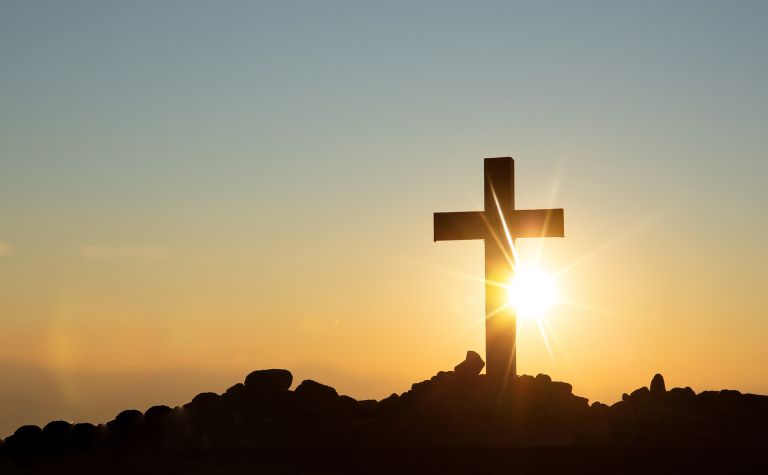Easter is one of the most important dates on the Christian calendar. It’s important because it’s the annual day that believers gather in churches to celebrate the resurrection of Jesus Christ from the dead. The Apostle Paul explained the resurrection’s significance, saying that if Jesus didn’t rise from the grave, then the faith of Christians was worthless (1 Cor. 15:17). So, is Easter also important to Jews?
Jews don’t celebrate Easter because they don’t believe Jesus of Nazareth is the Messiah that the Hebrew Bible (i.e., the Christian “Old Testament”) foretold. Moreover, because Jews reject Jesus as Messiah (i.e., the “Christ” in the New Testament), they don’t believe he rose from the dead.
Did anyone see Jesus alive after his crucifixion? Did Jesus appear to Jewish people or Gentiles (non-Jews)? Is the gospel that Jesus’ preached for Jews or Gentiles? How many first-century Jews believed that Jesus was the Messiah and followed him as a result? How do Christian and Jewish beliefs compare? Keep reading to learn the answers to these questions and others.
Also, different cultures and some countries celebrate Easter in a unique way compared to the rest of Christianity. Find out when Greek Easter is to gain more insight.

Did anyone see Jesus alive after his crucifixion?
The New Testament teaches that Jesus of Nazareth was crucified and rose from the dead three days later. While the authors of the Gospels, Matthew, Mark, Luke, and John, wrote unique biographies of Jesus, they universally testify to Jesus’ death on the cross and his resurrection three days later.
Did anyone see Jesus alive? The Gospels and other books like Acts and 1 Corinthians contain reports of Jesus appearing to people after he rose from the dead. The appearances occurred in different places and to various people. Jesus not only revealed himself to his most faithful followers but to skeptics like Thomas. He even appeared to over 500 people at one time.
- Jesus appeared to Thomas: “Then he said to Thomas, ‘Put your finger here, and see my hands; and put out your hand, and place it in my side. Do not disbelieve, but believe.’ Thomas answered him, ‘“’My Lord and my God!'” (John 20:27-28)
- Jesus appeared to over 500 people: “Then he appeared to more than five hundred brothers at one time, most of whom are still alive, though some have fallen asleep.” (1 Cor. 15:6)
After Jesus rose from the dead, he appeared to hundreds of people. He comforted some, like Mary Magdalene (John 20:11-18). He convinced others, like Thomas, to believe in him (John 20:24-29). Jesus forgave and restored Peter, who had sinned against him (John 21:15-19). He also continued to teach his followers about himself so they would be encouraged and understand what to do next (e.g., Acts 1:8).
Also, one of the terms that many Christians use around Easter is Resurrection Sunday. See the full article to gain more insight.

Did Jesus appear to Jewish people?
Jesus appeared mostly to Jewish people. The first people to believe Jesus was the Messiah were Jews. The first people to see him alive were also Jews. Jews, like Matthew, were among the authors of the New Testament (Matt. 10:3. Rigidly devout and highly-educated Jews, like Paul (formerly known as Saul of Tarsus), became persuaded and believed in Jesus’ resurrection (Acts 9:1-19).
Is the gospel for Jews? The gospel — Jesus’ message of good news about God’s salvation for sinners — is for all people, regardless of race, gender, or social standing. Jesus preached to Jews and invited people of other races and religious backgrounds to put their trust in him alone for salvation (John 14:6; Acts 4:12). In the book of Acts, Luke records that Jews and non-Jews (i.e., Gentiles) believe in Jesus.
At the end of his Gospel, Matthew records the risen Jesus teaching his disciples to preach to people of all ethnicities. “Go therefore and make disciples of all nations, baptizing them in the name of the Father and of the Son and of the Holy Spirit, teaching them to observe all that I have commanded you. And behold, I am with you always, to the end of the age” (Matt. 28:19-20, ESV, emphasis added).
How many Jews became followers of Jesus? Unfortunately, first-century historians don’t mention how many Jews became followers of Jesus, probably because an accurate number is impossible to know. However, enough Jews believed in Jesus to completely transform their way of life in first-century Rome. There are many examples of this transformation, one of which is the day of worship.
Mark Dever writes, “These first-century Jews – thousands and thousands of them – suddenly changed their normal day of worship from Saturday to Sunday. Sociologists tell us that the most ancient parts of a culture are found in its religious rites. They are the most conservative elements of a culture, the least likely and slowest to change. What then can account for this sudden change around the Mediterranean, among thousands of first-century Jews, from worshiping on Saturday to worshiping on Sunday?” [1]
Also, Christians have different ways of observing Easter. Some observe Easter Monday. See the full article to learn more.

How do Christian and Jewish beliefs compare?
Jews and Christians have similar beliefs because Christianity is rooted in Judaism. The sacred text of the Jews, the Hebrew Bible, is what Christians call the “Old Testament.” Unlike Jews, Christians believe that Jesus of Nazareth is the “Messiah” (the Hebrew word) or “Christ” (the Greek word) the Hebrew Bible foretold. Jewish people don’t recognize Christianity’s “New Testament” because it’s about Jesus.
Yet, because of their shared history, Jews and Christians have similar beliefs. For example, they believe God inspired the Hebrew Bible or Old Testament writings, like Genesis, Psalms, and Daniel. They learn about God and faith from figures like Abraham, Moses, Ruth, David, and Esther. And they both believe in the same stories and teachings, like the global flood in Noah’s day and the 10 Commandments.
- Monotheism: Jews are monotheistic, meaning they believe in one God. Christians are also monotheistic, yet believe God is a Trinity, existing in three persons: the Father, Son (Jesus), and the Holy Spirit. Jews don’t believe that God is a Trinity.
- The Law: Jews believe the Law, which consists of God’s religious and civil commandments to people, summarized in the 10 Commandments, is still operational today. While Christians adhere to the moral principles of the Law, they believe Jesus fulfilled it (Matt. 5:17).
- Covenants: Throughout biblical history, God made significant promises to people called covenants. For example, the Hebrew people, who eventually became the nation of Israel, started when God promised Abraham descendants. God also made important covenants with Noah, Moses, and David. Christians believe that Jesus fulfilled the New Covenant that the Jewish prophet Jeremiah foretold (Jer. 31). Jews believe its fulfillment lies in the future.
Also, many people notice a relationship between Passover in Judaism and Easter in Christianity. Learn precisely how Passover and Easter are related to gain more understanding.
References:
[1] It Is Well by Mark Dever and Michael Lawrence, p 141.
Related Questions
The resurrection of Jesus Christ, along with his crucifixion, is the most important event in Christianity. Without it, the faith that Jesus founded would be groundless. As the Apostle Paul taught,...
The life of Jesus Christ is of supreme importance in Christianity. As recorded in the Gospels, who he was, what he did, and what he taught comprise the centerpiece of his followers' faith, worldview,...
